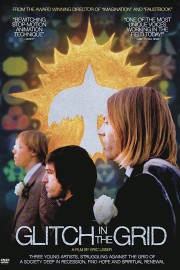Glitch in the Grid
Back in 2007, I received a screener for a film called, “imagination.” It was not a polished film technically, and it was hardly a perfect film, but its distinctive, spiritual story of two twin sisters has stayed with me, less for its emotions but its images. “Glitch in the Grid,” the latest collaboration between that film’s key collaborators– Jeffrey Leiser and director Eric Leiser –is very much the same way, but also feels more assured from a technical standpoint, and bolder narratively. It still has a lot of rough edges, but it definitely stands as a step above the earlier film.
Using a variety of techniques, most especially stop-motion animation and time-lapse photography, the Leiser brothers are telling the story of three Los Angeles artists who are finding meaning and purpose during the early months of the current recession. The film doesn’t tell a story so much as put us into the minds and philosophies of these characters, showing us their own attempts to create in an uncertain time. Rough times can sometimes be great inspiration to artists, but what happens when life has seemed to throw TOO much at an artist at one time? The trio take road trips, and one even considers moving to New York– where a woman he loves lives –in an attempt to find that spirit that inspires creativity.
There are two films, both wildly different from one another, that came to mind while watching “Glitch in the Grid.” The first was Richard Linklater’s “Waking Life,” which presented similar formal challenges both narratively, as well as technically. The second was Andrei Tarkovsky’s “Andrei Rublev,” which also looked at an artist’s struggle in a politically-complicated work to follow the guiding light of his creative spirits. In form and structure, none of these three films are alike, and I don’t mean to compare this film to those masterpieces in terms of quality. But on the strength of what is accomplished in this film, as well as their earlier film (which was one of my first screeners I was sent), I can definitely see these brothers continuing to stretch the boundaries of cinematic storytelling, and maybe even carving out a highly individual place for themselves as Linklater and Tarkovsky have.










